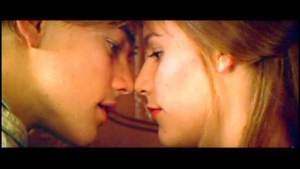“Oh wilt thou leave me so unsatisfied?”
It’s happened to us all. You cosy up on the couch to watch a movie but despite the massive bowl of popcorn, industrial size bag of malteesers, pint glass of coke and a surround sound system that could shake the dead in their shrouds, after twenty minutes you’re squirming, fidgeting and generally feeling vaguely frustrated. You channel surf in the hope of finding something better – or you stick it out to the bitter end but wander off to bed lamenting the fact that you’ll never get those wasted two hours of your life back again. So what is it that draws you into a story and then leaves you feeling deeply satisfied at the end???
I’ve recently been looking at how writers begin and end their stories. One question that frequently appears on the Junior Cert asks you to examine whether the opening and/or closing scene of the novel/play/short story you have studied impressed you. For the Leaving Cert you need a firm grasp of how your single and comparative texts begin and end. Regardless of genre – film, novel, play or short story – as a reader/viewer you have certain expectations & if these are not fulfilled you may just walk out of the theatre or throw aside the book! However you may find it difficult to verbalise exactly what it is that left you feeling frustrated & disappointed so here’s a list:
The opening chapter or scene should do most or all of the following:
- Introduce the setting – where and when the story takes place.
- Grab your attention – make the reader curious by holding back info. & creating some unanswered questions in our minds.
- Introduce main characters AND make sure they are in some way likable/sympathetic.
- Something should happen – the plot should begin.
- You might want to introduce the central theme(s).
- Style of writing or mise en scene must be descriptive/cinematic.
What you do NOT want:
- Too much background info which slows down the pace of the action & can make it boring.
- Too many characters introduced all at once which can be confusing.
- If you find the language or plot too difficult it can be off-putting – but this might be ‘your’ problem so be wary of writing off a novel or film for this reason.
However a novel/play or film can have a perfectly decent opening scene but still leave you with a sour taste in your mouth. We’ve all had the experience of coming out of the cinema feeling vaguely harassed and bewildered because the end just didn’t make sense. Or it was totally predictable and cliched. Or it was cheap – some kind of deus ex machina because the writer couldn’t think of any other way to end things. So here’s a list of elegant endings…
The end of a film/play/novel should do most or all of the following:
- Writer must give us closure – an air of finality. We need the writer to tie up most loose ends (generally speaking to be left thinking is good, to be left wondering is annoying).
- You want a twist – an ending which is unexpected makes us feel shocked & energised. A predictable ending (one which is clichéd & expected) is boring & disappointing for the audience.
- The end must make the audience FEEL something – it doesn’t matter whether it’s happy or sad or frightening or a mixture of loads of conflicting emotions. The important thing is that you made the audience care about the characters & the ending produced an emotional response in them.
- The end should leave you feeling that you’ve learnt something, it should leave you thinking about the themes & characters and should somehow capture a profound truth about life. The best stories change you as a person and offer you a new way of looking at the world.
What you do NOT want:
- Sudden ending – we’re left with no film idea of what happened to the main characters.
- Predictable ending – no twist, nothing unexpected. A story-by-numbers which follows genre rules so closely that we know exactly what to expect.
- Lots of loose ends left dangling. Challenging us to decide for ourselves what the ending means is fine but don’t just ‘forget’ to resolve things.
- Tacked on / far-fetched / sudden ending – one that doesn’t ‘fit’ in with the rest of the plot or one that isn’t credible.
- An ending which kills someone off for no good reason – or worse a story with such lacklustre characters that you don’t care if they live or die!
My students also suggested that you don’t want an ending where good is punished and evil rewarded. I don’t really agree with this. Of course bad things happening to good people is upsetting but it’s also true to life. Sadly.








